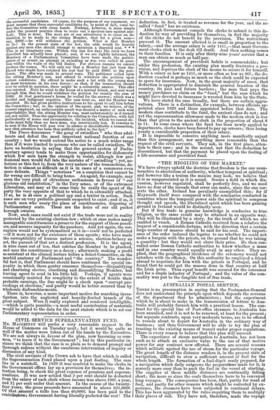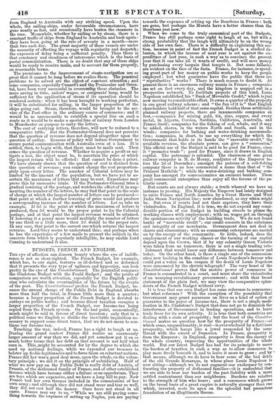AUSTRALIAN POSTAL SERVICE.
THERE is no presumption in saying that the Postmaster-General does not understand the principle upon which depends the revenue of the department that he administers ; but the experiment which he is about to make in the transmission of letters to Aus- tralia will probably furnish him with a practical lesson. The con- tract for the special line of Post-office steamers to Australia has been annulled, and it is not to be renewed, at least for the present; but separate contracts, upon very moderate terms, are to be offered to vessels about to depart for Australia in the ordinary way of business ; and thus Government will be able to try the plan of trusting to the existing means of transit under proper regulations. There is every reason to believe that this plan will succeed. The experience of steam navigation to Australia has not been such as to attach an exclusive value to the use of that motive power for any contract now effected. There are several reasons which militate against the use of steam for the particular voyage. The great length of the distance renders it, in the present state of navigation, difficult to stow a sufficient amount of fuel for the whole length. The formation of a fuel-depot ready prepared, for a navigation which daily outgrows the preparations made for it, is scarcely more easy than to pack the fuel in the vessel at starting. The supplies at these middle distances are continually falling short ; the more so since the coals themselves have to be conveyed long voyages. The consequence has been, that, partly for want of fuel, and partly for other reasons which might be corrected by ex- perience, the steamers have been subjected to continual delays. This has been aggravated by the rules requiring them to multiply
i
the places of They have not, therefore, made the voyage from England to Australia with any striking speed. -Upon the whole, the sailing-ships, under favourable circumstances, have gone nearly as fast, and occasionally have beaten the steamers in the race. Meanwhile, whether by sailing or by steam, there is a constant traffic of ships from England to Australia and back again : • they have been going at the rate of seventy in a month—more than two each day. The great majority of these vessels are under the necessity of effecting the voyage with regularity and despatch; the expenses of delay being a sufficient penalty. Thus there is that constancy and steadiness of intercourse which is the basis of postal communication. There is no doubt that any of these ships would be ready to receive mails, and to account for them properly, on reasonable terms.
The premiums to the improvement of steam-navigation are so great that it cannot be long before we realize them. The practical problems to be solved are the object of constant attention ; and some companies, especially Cunard's and the Peninsular and Orien- tal, have been very successful in overcourhag these obstacles. The mere saving in time, sailor& wages, or emigrants' keep, would be sufficient for the application of steam if its operation should be rendered certain : when it has been brought to working perfection, it will be substituted for sailing, in the larger proportion of the ships going out. Steam, therefore, would be brought to the ser- vice of the Post-office in the ordinary course of commerce; and it would be as unreasonable to establish a special line on such a route as it would be to make a special line of railway from London to Manchester on purpose to carry the letters.
The cost of carrying letters, therefore, will now be reduced to a comparative trifle. But the Postmaster-General does not perceive that the question of revenue does not depend altogether upon the question of outlay. Reasons of policy will induce Government to secure postal communication with Australia even at a loss. It is settled, then, to begin with, that there must be mails sent. Then comes the question of revenue. Whether to acquire a profit or mi- tigate a loss, the object must be, to ascertain the price at which the largest return will be effected : that cannot be done a priori. We have already shown that the question of cost is distinct from this question of revenue ; you cannot charge the cost proportion- ately upon every letter. The number of Colonial letters may be limited by the amount of the population, but we have yet to as- certain the maximum of letters that may be sent. Experience may prove this by successive trials. If the Postmaster-General tries a gradual lowering of the postage, and watches the effect of it in aug- menting the number of the letters, he may find that point in the scale of charge at which the largest number of letters can be produced—. that point at which a further lowering of price would not produce a corresponding increase of the number of letters. Let us take an example. If 3d. is the point at which the maximum of letters is produced, then 3d. would be the proper point to fix the Colonial postage, and at that point the largest revenue would be attained. If lowering it a penny more would multiply the number of letters by one third or a little more, then 2d. would be the proper rate. In any case, that point is the correct one which returns the largest revenue. Lord Grey seems to understand this ; and perhaps when he has the experience of a few mails to present the subject in the concrete form which is popularly intelligible, he may enable Lord Canning to understand it also.



























 Previous page
Previous page